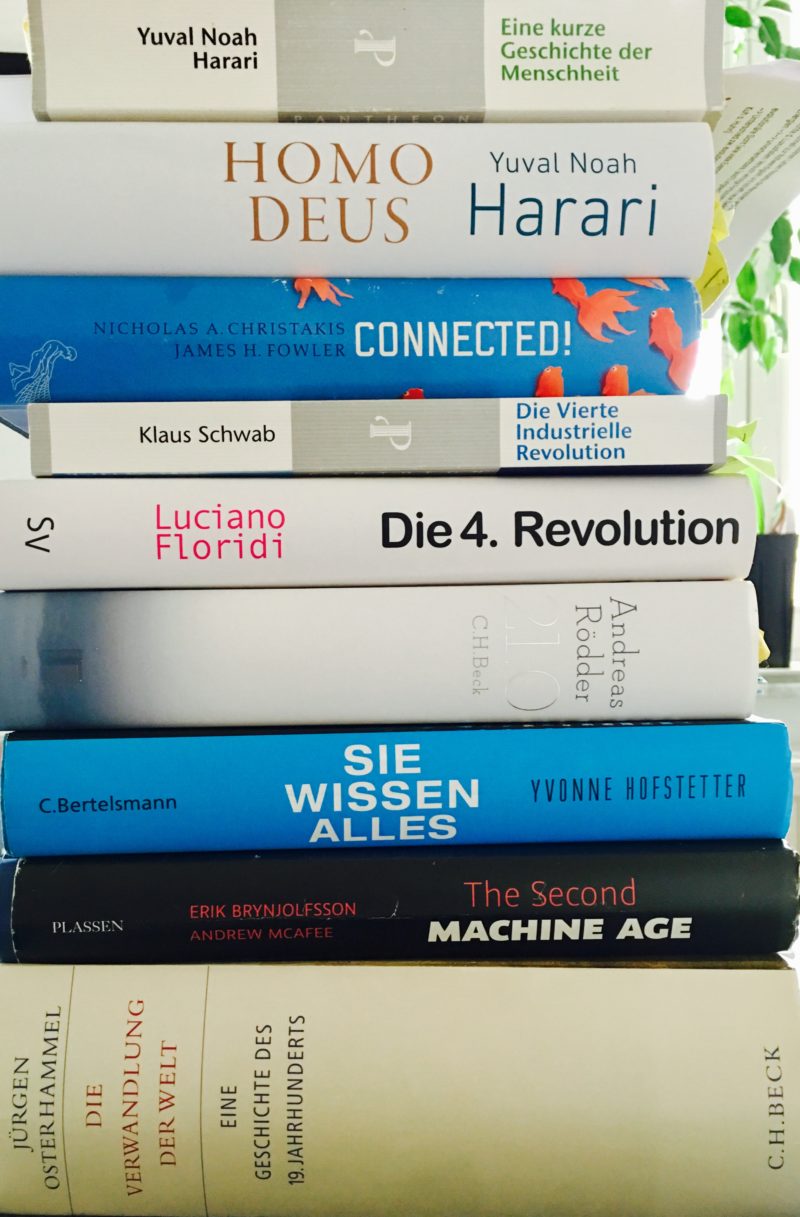10 books on digital transformation that are worth reading – and a few more.
When paper helps to understand the digital world.
Last week it was that time again: I spent four days sailing on the Baltic Sea with works council chairmen from various industrial companies. Once again, the aim was to look the upcoming changes brought about by the digital transformation in the eye. What are companies and industries in Germany facing? What is being worked on? What do we need to work on? What do we need to prepare for?
How is „this whole thing“ to categorise?
But on a sailing ship, things can never be definitively planned. It's like in the VUKA World. Decisions are made on an uncertain data basis in the context of a complex environment, including the contradictions and volatility of changing circumstances. And there are few other places where theChanges in the digital world For thousands of years, people sailed in wooden ships, exploring the world, transporting goods (in the early modern period, the height of sailing: especially slaves!) and conquering continents. And all at once and within a few decadesthis world of sailing ships literally goes under – and the world of iron steamships and motorised ships emerges. The great private companies of the Old World did not see this disruptive innovationand went under.
In the end, there was little time left at the seminar on the sailing ship: the weather and some heavy rain demanded everything from us! There was only a little time to talk about one or two books. That's why I decided on board to present the most important books here in the blog and not on board.
The following books helped me to approach the complexity and urgency of the subject, which I was inherently against computers. I was only able to come to terms with my personal trauma of being placed in front of an IBM 486 at the age of 16 for my youth initiation and being unsuspectingly at the mercy of the flashing sign that constantly prompted me to enter a command, which remained hidden from me, by reading – and am now writing this blog post ;-)
Let's go’!
1. the organiser – the big picture
Homo Deus by Y. N. Harari, 2017
After the young Israeli pop star among historians with his first work „A brief history of mankind“ (2011) a genuine bestseller that was highly praised by everyone - Obama and Gates, for example - Harari's second major work „Homo Deus. A story of tomorrow“ (2017) a coherent „continuation“.
Humanity has the three great plagues (disease, war and famine) eliminated and is now able to new world problems place (Human limitations, Short-lived happiness, Mortality). According to Harari's assumption, mankind will continue to strive to optimise itself and that means: continuing to fight its mortality, stopping the ageing process, in short: creating Amortale; continuing to pursue happiness, but now by manipulating it biochemically. The limits will be lifted. Which boundaries are meant? The boundary between machine and human, between life and death.
Anyone who wants to be pessimistic about this should remember that even today, homo sapiens still live in the forests of South America and have never heard of peasantry, sedentarisation, religion, democracy, human rights, dictatorships, big cities and collecting old clothes. For them, we are already gods. In the future, Harari believes, we ourselves will in a sense become similar to these Amazon people of yesterday – because our descendants will truly have become gods in view of their abilities.
Harari's work provides a historical framework for categorising the digital transformation – like no other.

2. the classic
The Second Machine Age by E. Brynjolfsson and A. McAfee, 2014
In their book, which has now become a standard reference work, the two scientists from the Massachusetts Institute of Technology (MIT) outline the areas in which the digital transformation will take place. Their mental framework is very simple. The Industrial revolution has broken the boundaries of muscle power – through which we were able to transform the world.

The The second machine age, for its part, will go beyond the limits of our power of thought and we will not only change the world – but ourselves, as Harari (No.1) makes clear. However, Brynjolfsson and McAfee still describe these changes with technology-focussed optimism. The message is kept simple: We had already experienced such a comprehensive revolution once before and „we“ have (almost all) emerged better, happier, healthier. Indisputable.
Harari sees things a little differently from a historical perspective: when the machines of the first revolution emerged, people painfully learnt to do work that did not require muscle power but did require thinking power. But what will we humans do when machines think better and make better decisions in the future? Oh yes, these machines will also be better artistically.
„The Second Machine Age – How the next digital revolution will change all our lives“, 2014 also has the advantage that it simply divides human history into two or three parts with regard to its machines. The time before Watts' steam engine, a time without machines, the time afterwards and the emerging second machine age (what will be its equivalent to Watts' steam engine?).

3. the admonishers
You know everything by Y. Hofstetter, 2014
For Frank Schirrmacher, the former editor-in-chief of the Frankfurter Allgemeine Zeitung, Yvonne Hofstetter was a Key figure in the discussion about big data and our social future. Hardly anyone else currently seems to have the intellect, experience and cognitive ability to communicate on this topic than Yvonne Hofstetter. She puts her finger in the wound, turns the coin that shines all too brightly on Google's home screen and names the dangers for our democratically organised coexistence.
In „They know everything. How intelligent machines are invading our lives and why we must fight for our freedom“ (2014) and The end of democracy. How artificial intelligence is taking over politics and disenfranchising us “ (2016) she explains in detail and conclusively what risks we are taking and how the „overwhelming process“ is creeping along. In view of her analyses and assessments, her well-intentioned antidotes and advice pale into insignificance.
Admittedly, an antidote seems questionable because it would simply have to do without finding smart answers to pressing questions. It's not as if we are forced to utilise the benefits of tech companies and the internet – we do so voluntarily, willingly and frequently. After all, the solutions offered by big data, AI and digitalisation are simply good and efficient. We wouldn't make better decisions if we didn't consult these machines. Sooner or later, machines will solve human problems better and "more cheaply". Economically, it will simply be an advantage to consult an AI instead of humans. What kind of antidote do you want to find?


4 The philosopher
The 4th revolution by L. Floridi, 2015
The first major contribution to categorising the digital transformation in the development of humanity was made (to me) by the Italian Luciano Floridi with his work "The 4th revolution". At first, I expected a depiction of the four industrial revolutions, but far from it. Floridi is not concerned with technology as such, but rather with how it fits into the overall social development of mankind. In doing so, he examines the interplay between man and technology. He differentiates between pre-historical, historical and hyper-historical societies. The decisive criterion here is the development, utilisation and design of information and communication technologies.
He poses the question of Interfaces between people and technology into focus; they are the critical success factor. If the interface is not good, the technology is no good. In doing so, he incidentally categorises the fascination with Apple products in the noughties of the third millennium – namely as a breakthrough for computer technology for mankind. Because The problem with the technology to date has not been the technology, but the design of the interface. Apple's merit is to The value of design for technology, not for aestheticsto have worked out!
(Of course, this does not apply to the new headphones!)
What was particularly important to me about the book was that ONLIFE concept; the realisation that we belong to the last generation that will distinguish between on/off, between online and offline, and that in future there will be a real life that merges both areas.
See also this short interview with Floridi in the FAZ.
5 The economist
The Fourth Industrial Revolution by Kl. Schwab, 2016
Somewhat less abstractly, the Founder and former Chairman of the World Economic Forum Klaus Schwab on the developments of the digital transformation. His – not excessively exuberant – booklet is anything but an intellectual lightweight, but does not have the depth and daring of Floridi or Harari. But the sober listing and stringing together „ of all“ significant developments makes one thing immediately clear: the interplay increases the significance of the overall development exponentially! It is not about the individual invention that leads us into the abyss. There is no second atomic bomb. Rather, it is the guerilla-like overall system, driven by curiosity, striving for power and a thirst for meaning, whose individual elements act in a stabilising and expansive way. The combinatorics of the sub-disciplines – as the inventor Charles Kettering already stated – will accelerate the development of all, even if nothing significantly new is invented.
Schwab therefore quickly makes it clear that this is not a development that should cause us concern or herald opportunities for long-awaited solutions to problems. There are many different areas and strands of development that in themselves would fill the history books of the future. We like linear stories, but history will hardly ever be linear.
6 The economic historian
The Innovator’s Dilemma by Cl. M. Christensen, 2013
This is the classic par excellence. Every startup has a copy of „The Innovator’s Dilemma. Why established companies are losing the competition for groundbreaking innovations “ (1997/2013) standing in the corner – or digital. It is the book that not only scientifically, i.e. mathematically and numerically driven, traces and clarifies historical developments, but also encourages every young entrepreneur to take up the fight for a (market) place in the business world. More than almost any other development, digitalisation offers the opportunity for self-employment – even if this development is certainly taking its toll (clickworkers, gig workers, professional bloggers, etc.).


With Christensen's „Innovator’s Dilemma“ the danger can be recognised, with Ries‘ „Lean Startup“ solution approaches.
Both are not primarily about realisation and reflection, but about realisation and action.
7. the pupils
Silicon Valley by Chr. Keese, 2014
In 2013, the Springer publishing house organised a Class trip to Silicon ValleyKai Diekmann, Peter Württemberger, Martin Sinner and Christoph Keese, all with their families. In the meantime, such Learning Journeys This is no longer unusual, but only very few are able to do so consistently and economically, 6 months to live there, immerse yourself and return thirsty for action. For Springer-Verlag, this trip gave rise to important innovative business ideas and fields that still resonate today. For Christoph Keese, it was the Launch of two wake-up call books: „Silicon Valley. What's in store for us from the world's most powerful valley “ (2014) and „Silicon Germany. How we are creating the digital transformation “ (2016).
Both books were a valuable read for me, even if I certainly won't read them again (unlike other works mentioned here). Keese's writing is calm, observant and to the point. Simply good journalistic writing!
As a journalistic observer, albeit with his own economic interests as a representative of the Springer publishing house, he categorises the developments he observes in larger, above all social contexts. His analyses of German conditions, challenges and opportunities are among the best available. You don't always have to agree with him in detail, but these two books have been enormously important for the perception and attribution of meaning to the digital transformation in Germany.
As a pupil of a completely different kind Mario Herger who, with his book „The Silicon Valley Mindset. What we can learn from the innovation world champion and combine with our strengths“(2016) Herger writes about his experiences as a migrant in Silicon Valley. Formerly Head of Development at SAP, Herger has been living permanently in Silicon Valley since 2001 and is considered an expert in gamification and advises (mainly German) companies that want to combine the best of both worlds.
8. the heaters
Germany 4.0 by T. Kollmann and H. Schmidt, 2016
Holger Schmidt and Carsten Knop, both (former) editors at the FAZ, one responsible for questions about the Internet, the other for companies, have each written a book on the subject. Both have gained deep insights into the development and economy of the Internet over the years and summarise their impressions here.
Independently of each other, they have each brought in a personnel heavyweight: Holger Schmidt, with his blog Network economist one of Germany's most successful bloggers, has joined forces with Prof Dr Tobias Kohlmann, The result of this is a book by the owner of the Chair of E-Business and E-Entrepreneurship at the University of Duisburg-Essen, a real business expert who is also an active – Business Angel of the Year 2012 and developer of the first UMTS app in Germany (2004). Together, the two of them have dedicated themselves extensively to the topics of Germany 4.0 and the result is a a real wake-up call, The language was sober, but the content was really explosive. Nevertheless, it seemed to me that the response was rather lacking, which I really regret. (But maybe I'm wrong, have you heard anything else?)


9. the driving instructor
Who will get their act together? Turning point in the automotive industry by F. Dudenhöffer (2017)
Prof Dr F. Dudenhöffer, Director of the CAR Institute at the University of Duisburg-Essen and German car popetackles the hot potatoes in his book on the current state of the German automotive industry. He addresses the next three major leaps in the development of the automotive industry towards mobility services in an unsparing but not devastating way: E-drive, networking and robot cars. All three developments have the potential to unhinge the German automotive industry. However, he also sees all three developments as opportunities for the German economy to „get its act together“ and remain in the lead.
Except for one development – for which he actually sees black: the muddled situation surrounding the core VW brand. Here he describes a disastrous network of management, co-management (works council unculture), government and legislation. A gloomy lesson!
Particularly helpful are Dudenhöffer's comments on historical long-term developments in the automotive industry, above all on environmental and consumer protection and the ideology-free assessment of the work of American authorities (California!).
For me, the book is a Real gain in the deeply German topic: Digital transformation of industrial heavyweights!
Not a book for startup fanatics who want to make everything American!
10 The cyberneticists
Machine twilight by Th. Rid, 2016
Finally, I would like to recommend another historical account: Dawn of the machine. A brief history of cybernetics by Thomas Rid (2016) – but this time not a general description of the development of Homo sapiens as in Harari, but of machine (control). Cybernetics is the name Science of the control of systems. And the revolutionary thing about this science was that it was about the Control of all systems goes. Cyberneticists make no distinction between the control of machine systems and the control of human, social systems. They look for similarities, patterns and possibilities. However, the control of people is not very popular, even if everyone (and how defiantly!) talks about leadership concepts and competences. But who leads whom in organisations is not just a question that is asked by those who are led, but also by those who lead.
But already at the Concept of feedbackwhich is now high on the list of priorities (of counsellors and HR managers) in humanistic social systems, has its origins in cybernetics and was developed on the basis of machine control. But that takes us too far into the history of cybernetics, which is really worth reading here.
What else is there to say – well, maybe: I would just like FEEDBACK from YOU ;-)

Which books were of interest to you in understanding the digital transformation a little better? I would be delighted to receive plenty of comments and feedback!















Leave A Comment